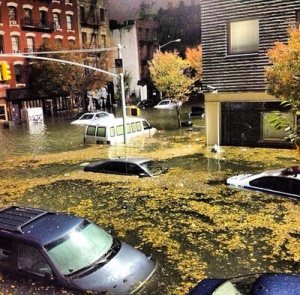 |
| Damage from Hurricane Sandy in the Rockaway neighborhood of Queens, New York |
Two full weeks have passed since Hurricane Sandy devastated large swaths of my city and state, and still so many New Yorkers are in desperate need: managing somehow to live in cold, dark, and now very dangerous neighborhoods–especially at night.
Unfortunately, as life for the rest of us returns to normal–new subway lines getting restored daily–the less fortunate are fading into the background. No 24-hour news cycle stories about FEMA and the Red Cross failing to keep up with the overwhelming demand, and less personal accounts from the selfless and compassionate volunteers who have rushed in when the government hasn’t. For many of us without affected friends or family, the ongoing suffering is becoming part of our new normal; invisible to us, like the homeless on the subway. Of course, the scale of the crisis hasn’t significantly lessened–only our perception of it.
It was perfectly clear that Sunday’s marathon had to be canceled, but since the national election on Tuesday jolted us back into “life must go on” mode, it is becoming increasingly difficult to make those calls about what is and isn’t appropriate. If it is unacceptable for some to celebrate while others are suffering, as many have charged, then haven’t we all been getting it wrong for most of our lives? Including those now in the dark? Before this storm, didn’t they celebrate their kids’ birthday parties knowing that children in the third world are starving? Apparently, there seems to be some collective determination of when it’s appropriate to shift the focus of our lives to a specific tragedy; some unique formula of time and distance.
 |
| East Village flooding |
Remarkably, this catastrophic hurricane that decimated coastal neighborhoods was practically a non-event up here in Washington Heights. But we had front row seats to the horror stories as they unfolded on NY1: the flooding in the East Village and Battery Park; the fires in Breezy Point; the explosion at the 14th Street power station; the evacuation of critically-ill babies from Langone NYU Medical Center when their emergency generator failed. I broke down when I heard about Brandon and Connor Moore, the two young boys who were swept out of their mother’s arms that fateful Monday night and whose bodies were recovered from a Staten Island marsh a few days later, and I was moved by the blog that incorporated their names into a comprehensive post including all of Sandy’s deaths so that none would fade into nameless statistics.
But now, two weeks out, I am disturbed by how easy it is to return to my pre-Sandy life. We’ve made our online donation to The Food Bank–took all of five minutes–are we done now?
Of course not. But there is no denying that unflattering part of human nature that so quickly wants to forget what isn’t right in front of us.
As usual, Brooks is forcing me into my better potential self, since I need to find a way to teach him that Hurricane Sandy was not just a nine-day weekend. Somehow, without frightening him, I have to make sure he understands what the storm did to his distant neighbors and how important it is for us to all help each other, especially during times like these.
 |
| (Photo : Reuters) Emergency personnel rescue residents from flood waters brought on by Hurricane Sandy in Little Ferry, New Jersey |
So we just signed up with Family-to-Family to sponsor a household in need. Since this involves personal letters to determine what kind of new or gently-used goods we can offer to help get them back on their feet, we hope to stay in touch with what’s really going on.
And I applaud the many other inventive ways to help out: the grass roots Occupy Sandy movement has used Amazon’s wedding registry to create a direct donation channel, and the Anthony Bourdain-inspired #EatDownTipUp hashtag initiative on Twitter encourages downtown dining paired with big tipping to help restaurants recover.
Although you can’t feel it walking across 42nd Street, Hurricane Sandy is still kicking up violent waves of hardship for scores of communities. This is not over for them, and it won’t be for a very long time.
At the very least, we owe them the courtesy of not letting them become so “last week.”
A good point… well made. (Kids always bring out the best in us, don’t they?)
I have noticed you don’t monetize your website, don’t waste
your traffic, you can earn additional bucks every month
because you’ve got high quality content. If you
want to know how to make extra money, search for:
Boorfe’s tips best adsense alternative